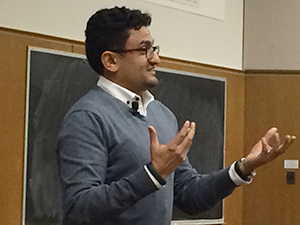How Facebook Sparked a Revolution
Dean’s Seminar Series welcomed Egyptian activist Wael Ghonim
On January 25, 2011, tens of thousands of Egyptians flooded Cairo’s Tahrir Square to protest the widespread police brutality, poverty, and corruption that raged under President Hosni Mubarak’s dictatorial rule. Chanting for freedom, the protestors were met by police clad in full riot gear and a truck-based water cannon. A bloody clash erupted, and among the disorienting chaos, one thing was clear: Egypt would never be the same again.
The rebellion was not organized by a charismatic leader or military group, but by Facebook users. In the days leading up to that fateful day, more than 90,000 people registered for the event “Day of Revolution,” organized by the Facebook page “We are All Khaled Said.”
The anonymous administrator of that page, Wael Ghonim, addressed the Northwestern community on Monday, April 13 in the Technological Institute. Sponsored by the McCormick Dean’s Seminar Series and Buffett Institute, Ghonim shared his experiences as a computer engineer-turned-activist.
“This story is a prime example of the connection between technology and global issues,” said McCormick Dean Julio M. Ottino. “It’s a connection that few would ever have predicted.”
 Ghonim remembers the first time he experienced the Internet. In 1997, he was a teenager sitting in an apartment in Cairo when his cousin brought home a cable, stretching it between the computer and a new modem.
Ghonim remembers the first time he experienced the Internet. In 1997, he was a teenager sitting in an apartment in Cairo when his cousin brought home a cable, stretching it between the computer and a new modem.
“We visited the Library of Congress’s website,” Ghonim recalled. “I was amazed.”
By age 18, Ghonim had started a popular Islamic website that broadcasted audio from religious gatherings and lectures. Inspired by the power and magic of the Internet, he earned a bachelor’s degree in computer engineering from Cairo University in 2004 and then, four years later, accepted a job at Google. At the time, Ghonim had not yet considered a life dedicated to activism and describes himself instead as merely “a concerned citizen.” After the death of a young Egyptian man named Khaled Said, however, Ghonim was motivated to act. On June 6, 2010, Said died under mysterious circumstances after being arrested by police. Photos of his disfigured corpse went viral, inciting outrage across the country. Launched four days after Said’s death, “We Are All Khaled Said” amassed more than 100,000 “likes” within just three days.
“At the time, people were less interested in calling for change because they worried that police would be waiting for them,” said Ghonim, who was nominated for a 2011 Nobel Peace Prize. “But as people saw more likes and comments on Facebook, they became empowered. And it’s not really about the likes: it’s about the unhappiness. People were unhappy with the Mubarak regime and sought change.”
At first, the Facebook page served as a place to organize “non-activist” protests. For example, supporters planned to wear black on the same day and stand in a line along the Nile River with their backs to the government. Ghonim stayed out of the spotlight, maintaining his anonymity as the page’s administrator. “This was for security reasons,” he said. “But also to give everyone equal ownership over the page. If no one owns it, then everyone owns it.”
When Tunisia’s longtime president resigned on January 14, 2011 after a successful revolution by its people, Ghonim’s optimism was roused. He organized the “Day of Revolution,” asking 100,000 people to gather in Tahrir Square.
“People were motivated to go from online to offline,” he said. “We knew this was our moment, our time for change.”
The January 25 event sparked two-and-a-half weeks of protests in Cairo, Alexandria, Suez, and other cities across Egypt. Although hundreds were killed and thousands were injured, Mubarak finally succumbed to the pressure. He resigned on February 11, 2011, and the nation celebrated.
“People think we started something very big,” Ghonim said. “But we started something very small, which was to challenge the status quo. If someone asked me for solutions to the all the problems in Egypt, I’d say ‘I don’t know.’ But we’re getting the country to where it deserves to be and meeting the expectations of the young.”